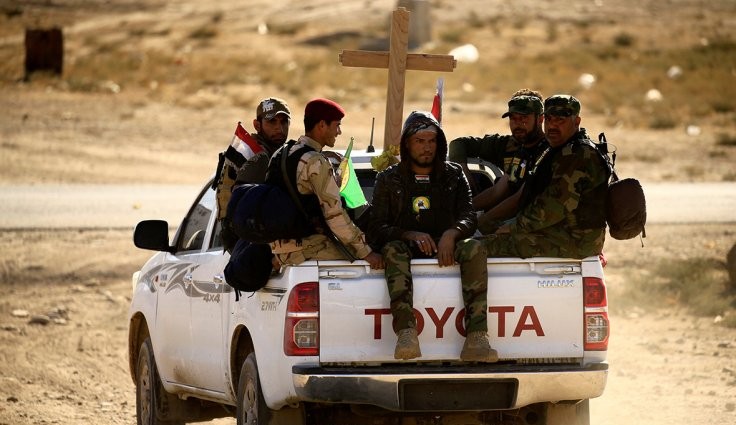Christian militia taking on Isis: ‘They burned our churches, desecrated our monasteries’

Sitting in a chair rimmed with faux-gold leaf and flanked by members of his Christian Babylon Brigade, its been just 48 hours since Commander Rayan al-Kildani returned from the battle in Mosul. He told of churches and Christian homes left in ruins by Islamic State (Isis) militants.
In the district of Hamandeya, Kildani said IS had doled out some of its worst punishment on the local Christian population as it carried out a scorched earth policy in the wake of its retreat.
"There is no house that was not damaged. All the churches were destoryed," the Christian commander told IBTimes UK. "The Christians from Hamandeya, none of them have returned to their homes … they have been obliterated, there is literally nothing left."
Kildani said Sunni Muslim towns had been left relatively undamaged as IS moved back into the confines of Mosul in the face of the advance by Iraqi government forces. He described how in one Christian area virtually every house had been destroyed and the infrastructure left in ruins. A Muslim area just five-minutes' drive away had experienced significantly less destruction.
In Christian areas liberated by Iraqi forces, Islamic State iconoclasm has been discovered in churches and other places of Christian worship. At Mar Behnam, a 4th Century Monastery, irreplaceable sacred texts were burned and sculptures of the Virgin Mary were smashed. Monks' bedrooms were turned into jail cells.
Hundreds of Kildani's fighters, operating alongside mostly Shia Muslim paramilitary bigades which were raised to counter the expansion of IS, remain on the front in northern Iraq where the Popular Mobilisation Forces (PMF) have been battling to cut supply lines at Tal Afar, 80km east of Mosul.
Kildani returns fresh from a string of victories. The Babylon Brigade has participated in the liberation of the ancient Asyrian city of Nimrud and the Sunni town of Ali Rashsh. However, with 17 of his men killed in the campaign, he says the fighting against IS in Mosul has been the fiercest in the two-year long battle to expunge IS from Iraq.
"Whoever considers Islamic State as a weak enemy is completely wrong. That information is misleading. IS is a very powerful force. IS militants fire until they run out of ammunition and then they will blow themselves up," Kildani said.
In Ali Rashsh the Babylon Brigade found themselves cut off and nearly overrun by IS. The fighters were in the path of a relentless IS onslaught. "We were beseiged by IS militants. We held just one checkpoint and couldn't leave. So we were surrounded on all sides. In the course of 18 hours 14 suicide car bombs were directed at us," Kildani said.
The Babylon Brigade was formed in 2014 following a fatwa by the highest Shia religious authority in Iraq to defend the nation against IS expansion. Kildani believes if there had been no Fatwa and the PMF had not been formed then IS would have taken control of Baghdad.
After fighting their way across Iraq through Anbar and Saladin province the commander describes the assault on Mosul as having always been the Babylon Brigade's main objective. The importance of liberating Iraq's second biggest city lies not just in its significance as IS' de-facto capital in the country but also because of its large Christian population.
A Christian unit in a predominantly Shia force, the Babylon Brigade is a strange hybrid. In the upper middle class home in Baghdad's al-Karada district that serves as its headquarters a crucifix hangs on the wall next to the PMF flag. When the Christian fighters go in to battle they carry wooden crosses on the back of their pickups while flying flags bearing the Shia insignia of the PMF.
Kildani said it makes little difference in the trenches whether the man fighting alongside you is Sunni, Shia or Christian but added that it will take time for the wounds inflicted by the Islamic State on the Christian community to heal.
"In the next one, one and half years very few families will return to their homes. There has been fear on both sides. We want to regain the trust between the Muslims and the Christians," he said
Stay up to date with our daily newsletter
Политика конфиденциальности | Правила пользования сайтом









